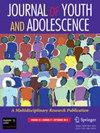Parental Emotion Socialization and Difficulties in Emotion Regulation in Adolescents: A Network Analysis.
IF 3.6
1区 心理学
Q1 PSYCHOLOGY, DEVELOPMENTAL
引用次数: 0
Abstract
Parental emotion socialization strategies influence adolescent emotion regulation development. However, there are still doubts about the supportive/unsupportive role of each strategy. This may be likely due to limitations of prior research that analyzed these strategies in isolation, without considering their interdependence. This study explored interactive patterns among parental strategies, clarifying which combinations were associated with fewer emotion regulation difficulties. Participants were 503 adolescents (60.8% female; Mage = 14.54; SDage = 1.17). Network and Expected Symptom Activity analyses indicated that reward and override strategies were associated with fewer emotion regulation difficulties, while punishment, neglect, and magnification were associated with greater difficulties. High reward (but not high override) mitigated emotion regulation difficulties unless alongside high neglect or two unsupportive strategies. Override helped buffered neglect's negative effects when combined with high reward. High values in all strategies were associated with more emotion regulation difficulties, while low values with fewer. These results emphasize the interactive nature of parental emotional responses during adolescence, suggesting that no strategy is inherently adaptive or maladaptive-it depends on the context of co-occurring parental behaviors. The findings also support the "good enough" parenting perspective, showing that positive and negative behaviors can coexist and still be associated with fewer difficulties in emotion regulation. In this context, neglect appears to be more detrimental than other emotion socialization strategies.父母情绪社会化与青少年情绪调节困难:一个网络分析。
父母情绪社会化策略对青少年情绪调节发展的影响。然而,对于每种策略的支持/不支持作用仍然存在疑问。这可能是由于先前研究的局限性,这些研究孤立地分析了这些策略,而没有考虑它们的相互依赖性。本研究探讨了父母策略之间的互动模式,阐明了哪些组合与较少的情绪调节困难相关。参与者为503名青少年(60.8%为女性;法师= 14.54;SDage = 1.17)。网络和预期症状活动分析表明,奖励和超越策略与较少的情绪调节困难相关,而惩罚、忽视和放大策略与较大的情绪调节困难相关。高奖励(但不是高覆盖)减轻了情绪调节困难,除非同时存在高度忽视或两种不支持策略。当与高奖励相结合时,覆盖有助于缓冲忽视的负面影响。所有策略的高值与更多的情绪调节困难相关,低值与更少的情绪调节困难相关。这些结果强调了青春期父母情绪反应的互动性,表明没有策略是天生的适应或不适应——它取决于共同发生的父母行为的背景。研究结果还支持了“足够好”的育儿观点,表明积极和消极的行为可以共存,并且在情绪调节方面的困难较少。在这种情况下,忽视似乎比其他情绪社会化策略更有害。
本文章由计算机程序翻译,如有差异,请以英文原文为准。
求助全文
约1分钟内获得全文
求助全文
来源期刊

Journal of Youth and Adolescence
PSYCHOLOGY, DEVELOPMENTAL-
CiteScore
8.20
自引率
6.10%
发文量
155
期刊介绍:
Journal of Youth and Adolescence provides a single, high-level medium of communication for psychologists, psychiatrists, biologists, criminologists, educators, and researchers in many other allied disciplines who address the subject of youth and adolescence. The journal publishes quantitative analyses, theoretical papers, and comprehensive review articles. The journal especially welcomes empirically rigorous papers that take policy implications seriously. Research need not have been designed to address policy needs, but manuscripts must address implications for the manner society formally (e.g., through laws, policies or regulations) or informally (e.g., through parents, peers, and social institutions) responds to the period of youth and adolescence.
 求助内容:
求助内容: 应助结果提醒方式:
应助结果提醒方式:


